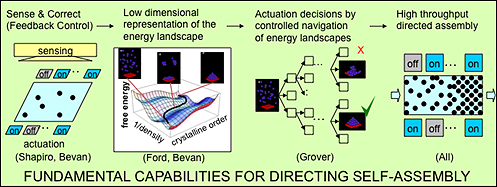Shapiro on Nanotech Team for Assembly of Colloidal Crystals
Associate Professor Benjamin Shapiro (BioE/ISR) is a co-PI on a new National Science Foundation grant to develop tools that could mass-produce revolutionary materials for future technologies such as optical computing, energy harvesting, sub-diffraction limit imaging and invisibility cloaking. “First-Principles Based Control of Multi-Scale Meta-Material Assembly Processes,” is a four-year, $1.2 million Collaborative Research Cyber-Enabled Discovery and Innovation Type II grant grant that focuses on precisely controlling ensembles of nanoparticles to create defect-free crystals for optoelectronic metamaterials, in a way that has the potential to scale up to fabrication. Such a development could have a similar revolutionary effect as the creation of single crystal silicon, which enabled integrated circuits and modern computing. The research combines Shapiro's lab capabilities in micro/nano feedback control with the colloids real-time imaging and experiments conducted by Michael Bevan at Johns Hopkins University; the statistical mechanics modeling of energy surfaces and arrested states of Principal Investigator David Ford at the University of Massachusetts Amherst; and the control and model reduction methods for statistical ensembles of Martha Grover, Georgia Institute of Technology. The assembly of colloidal nano- or micro-particles into perfectly ordered periodic structures provides a basis for manufacturing photonic band gap materials and other multi-scale meta-materials with unique electric, magnetic, and optical properties. Although proof-of-concept materials have been made in laboratories to verify their amazing properties, no existing process is yet sufficiently controllable, scalable, and robust for high-throughput manufacturing to enable commercial applications. Progress thus far has been through 25 years of trial-and-error efforts. A strategy of rigorous real-time control using quantitatively accurate process models, which is the focus of this research, is required. The fundamental limitation to assembling colloidal components into ordered structures is the complex interplay of thermal motion, interparticle interactions, and external fields that lead to defect-rich and often arrested states. The research will develop a new approach to the meta-material assembly problem that combines expertise from four separate scientific fields that traditionally have had minimal interaction. Mathematical models of the colloidal systems, represented as free energy landscapes in a few key variables that characterize the state of the assembly process, will be constructed using data from advanced microscopic imaging and analysis tools. The FELs will in turn be used as input to rigorous process control algorithms, developed for stochastic processes, that will navigate the landscapes to yield defect-free products. This strategy will be demonstrated and refined on prototype lab-scale reactors, using real-time digital microscopic imaging as the sensor and programmable particle-particle interaction potentials & electric fields as the actuators, to produce meta-materials.
Related Articles: September 22, 2011 Prev Next |


